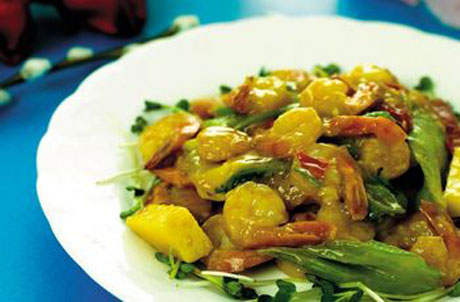(单词翻译:单击)
情景对话
Buddhi: So, Edwin, now that you're here, do you usually cook for yourself or you eat outside?
布迪:埃德温,你在这里是自己做饭吃还是在外面吃饭?
Edwin: I usually eat outside because I'm a very terrible cook. I could potentially burn salads.
埃德温:我通常在外面吃饭,因为我厨艺很差。我可能会把沙拉弄焦。
Buddhi: So, back at home, how was it done? You guys cook at home. I mean your mom.
布迪:那在家里的时候呢?是你妈妈做饭吗?
Edwin: My mom usually cooked. Because of my Chinese ethnicity, she usually cooks Chinese food, cause Australian food is pretty boring, so she cooks ... usually cooks Chinese food.
埃德温:一般是我妈妈做饭。我有中国血统,所以我妈妈经常做中国菜,澳大利亚菜很乏味,所以她会经常做中国菜吃。
Buddhi: I remember back in my country, we also do a lot of Chinese food, and they did turn out to be quite spicy. Is it spicy as well? Or maybe, it's because in Sri Lanka, we use the spicy stuff. Or what would you say?
布迪:我记得我们国家也有很多中国菜,通常中国菜都非常辣。你们那里也都是很辣的菜吗?还是因为我们斯里兰卡用的都是辣味调料。你们那里的情况呢?
Edwin: Well, some Chinese food is spicy. It just depends on which part of China it comes from. My parents are from Hong Kong, and Hong Kong food usually is not spicy, so yeah, I don't really like spicy food ... too spicy food, so yeah, my mom usually cooks really just bland food.
埃德温:有些中国菜的确很辣。这要取决于那是中国哪个地区的饮食。我父母来自香港,香港菜并不辣,我不喜欢辛辣食物,我不喜欢太辣的食物,我妈妈做的一般都是清淡的食物。
Buddhi: So, you guys always just eat Chinese food, or do you eat Australian food as well.
布迪:那你们是一直吃中国菜,还是也会吃澳大利亚菜。
Edwin: We rarely eat Australian food. My parents are pretty conservative when it comes to food, so yeah, they pretty much stick with Chinese food.
埃德温:我们很少吃澳大利亚菜。在食物方面,我父母非常保守,他们坚持吃中国菜。
Buddhi: If you do eat any Australian food, what kind of foods do you eat?
布迪:那要是吃澳大利亚菜的话,你会选择吃什么?
Edwin: I guess the most common one would be the meat pie. A lot of kids eat it in high school during lunch with tomato sauce, but something that's really interesting ... an interesting Australian dish would be the kangaroo.
埃德温:最普遍的食物是肉饼。有很多高中生午饭时会蘸番茄酱吃肉饼,澳大利亚有一种非常有趣的食物——袋鼠。
Buddhi: OK.
布迪:好。
Edwin: Yeah, I've had that a couple times. It tastes really good. You can call it a delicacy I guess, but we don't always eat it every day. Have you tried kangaroo?
埃德温:我吃过几次。味道非常不错。我认为那可以称得上佳肴,不过我们不是每天都吃。你吃过袋鼠吗?
Buddhi: Never. Never.
布迪:从来没有。
Edwin: Would you like to try?
埃德温:你想尝试一下吗?
Buddhi: I'll say yes, cause I like to try new foods, but I don't eat all kinds of meat. I just eat chicken only, so yeah, but I'll try cause you recommend it.
布迪:我想,我喜欢尝试新食物,不过我不是所有的肉类都吃。我只吃鸡肉,不过如果你推荐的话我会尝试看看的。

译文属可可原创,仅供学习交流使用,未经许可请勿转载
重点讲解
重点讲解:
1. turn out (以某种方式)发生;最后是;结果是;
例句:It turned out far better than I had expected.
结果比我预料的好得多。
2. as well 也;还;
例句:I write my own songs and I play the guitar as well.
我唱自己谱曲的歌,也弹吉他。
3. depend on 取决(于);有赖(于) ;
例句:Our success depend on your assistance.
我们的成功取决于您的协助。
4. when it comes to 谈及;
例句:I'm lost when it comes to using the computer.
碰到计算机的事我就糊涂了。


